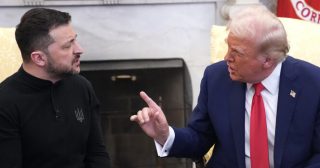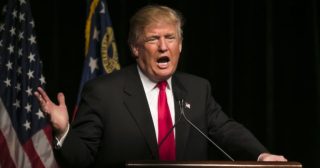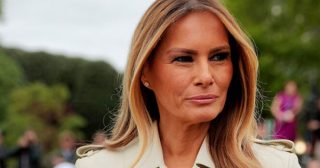Trump Stuns the World with Tariffs on Antarctic Islands—Where Only Penguins Live

Trump Stuns the World with Tariffs on Antarctic Islands—Where Only Penguins Live
In a move that has left social media buzzing, former President Donald Trump has recently announced a surprising decision: imposing tariffs on the Heard Island and McDonald Islands in Antarctica—remote territories that are home solely to penguins and seals. The internet has exploded with reactions, from bewilderment to humor, as people try to make sense of this strange move.
A Bold Move—But Why Penguins?
Trump’s new tariff policy, which includes a 10% import tax on products from the Heard and McDonald Islands, has raised eyebrows across the globe. These islands, located in one of the most remote regions of the world, have no human inhabitants. Instead, they are home to a variety of wildlife, including penguins and seals—creatures that are hardly known for engaging in international trade.

So, why would the former president target these uninhabited islands in the Southern Ocean? According to the Trump administration, it’s all part of a broader strategy to "Make America Wealthy Again" by imposing taxes on imports from nearly every corner of the world—except for Canada and Mexico, who are already embroiled in separate trade disputes with the U.S.

While the idea of taxing penguins may seem absurd, it fits into a larger narrative: an aggressive trade policy aimed at protecting U.S. industries and generating revenue. But many are left scratching their heads at the choice of these isolated islands.
The Internet Reacts—And It’s Hilarious
The news of these unusual tariffs has sparked a flurry of memes, jokes, and sarcastic remarks across social media platforms. Users are having a field day imagining the logistics of taxing penguins, leading to a wave of humorous commentary:
"Well, the penguins have been mooching off the U.S. long enough," one Twitter user quipped, reflecting the surreal nature of the announcement.
Another chimed in, "Penguins will be paying taxes now? That’s one way to ‘Make America Wealthy Again.’”
"I bet the penguins are loving the attention," someone joked, while another user humorously predicted, “Trump will start loading up 10% of the penguins for import tax.”
“Finally! Penguin eggs are going to be cheap for America now!” a witty observer commented.
It’s clear that many see the announcement as an absurdity—but the humor only emphasizes the unusual nature of Trump’s trade policies and their unintended consequences.
A World of Questions and Speculation
Given the near-impossibility of trade or commerce on these islands, people are left questioning the administration's motives. Why target a place that is essentially a frozen wilderness, inhabited by wildlife and devoid of any economic activity? Is this part of a broader political message or a symbolic gesture to reinforce Trump’s “America First” agenda?

Experts and social media users alike continue to debate the implications of this decision. Some suggest that it’s just another layer of Trump’s controversial trade strategy, while others view it as a mere publicity stunt designed to get attention.
The Bottom Line: Tariffs on the Ridiculous?
Whether you find it absurd, funny, or downright baffling, the announcement of tariffs on the Heard and McDonald Islands has certainly captured public attention. But for those wondering if these penguins will really feel the effects of the new policy, one thing is certain: the world will continue to watch with curiosity and amusement as this bizarre tariff story unfolds.
As the reactions continue to pour in, one thing remains clear—when it comes to Trump’s trade policies, nothing is too outlandish.
The Economic Ripple Effect: How Trump’s Tariffs Could Impact Global Relations
While many have laughed off the idea of imposing tariffs on uninhabited Antarctic islands, there are more serious economic implications that cannot be ignored. Although the Heard and McDonald Islands may seem like an unlikely target for trade policies, their inclusion in Trump’s new tariff plan could have broader consequences for U.S. foreign relations, particularly with Australia.
A Strained Relationship with Australia?
The Heard and McDonald Islands, while devoid of human inhabitants, are under the sovereignty of Australia. By imposing tariffs on imports from these remote territories, the U.S. may risk straining its diplomatic and economic relationship with one of its key allies. Australia, which has long managed the islands, could perceive the move as an unnecessary provocation—especially given the lack of any meaningful trade between the two nations in this region.
Setting a Controversial Precedent
Beyond Australia, this decision raises questions about the future of U.S. trade policy. Experts are speculating that such tariffs could set a dangerous precedent, signaling that the U.S. might start to target territories or nations based on symbolic or strategic reasons, rather than economic logic. This could complicate future trade negotiations, as countries may grow wary of U.S. tactics, fearing unpredictable and possibly arbitrary actions.
Distraction or Strategy?
Some political analysts suggest that these tariffs could be a diversion—a way to shift attention away from more significant trade issues that the U.S. faces with larger, more influential economies like China, the European Union, and Japan. With ongoing trade wars and disputes with major trading partners, some argue that the focus on such a minor and absurd target could be an attempt to deflect from larger economic challenges.
On the other hand, some critics see the tariffs as a sign of the administration's lack of understanding when it comes to the complexities of global trade dynamics. Instead of addressing pressing issues, like intellectual property rights or trade imbalances with China, the focus is being placed on an isolated set of islands that offer no tangible economic benefit.
The Road Ahead: Clarity or Confusion?
As this surprising tariff decision continues to make waves, the Trump administration will likely face mounting pressure to explain the rationale behind this move. Political leaders and trade experts are calling for a clear and coherent explanation of how such tariffs align with the broader U.S. economic strategy.

In the coming weeks, it will be interesting to see how the administration responds to the backlash. Will they double down on the decision, or will the controversy over the penguin tax force them to reconsider their approach? Only time will tell.










